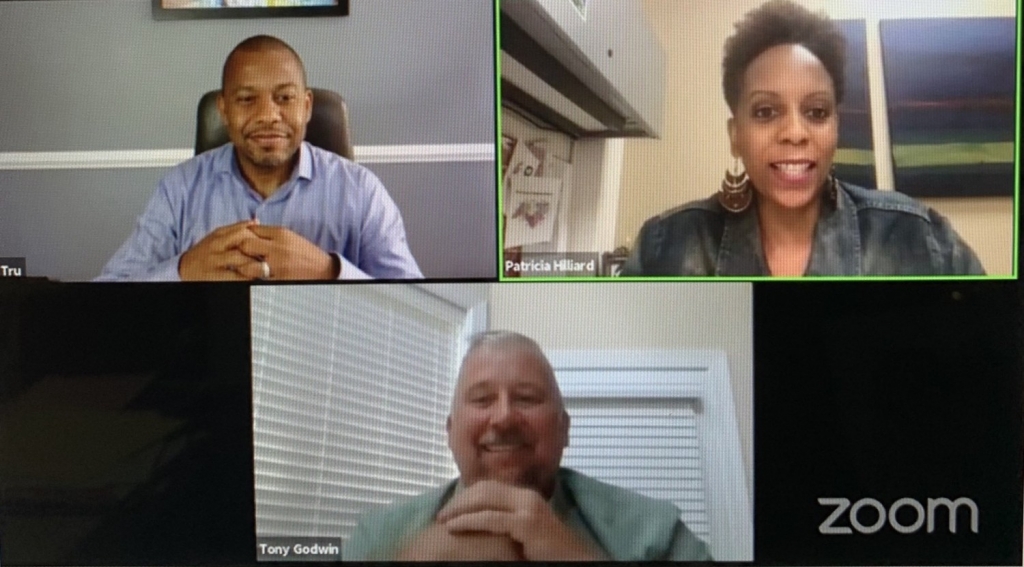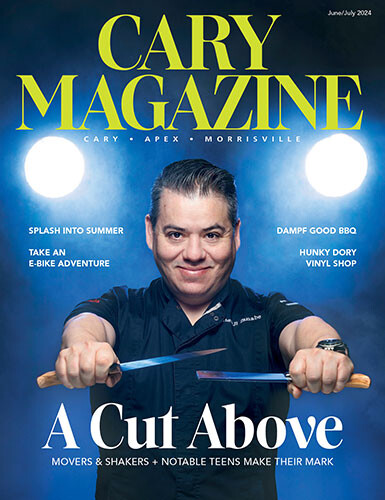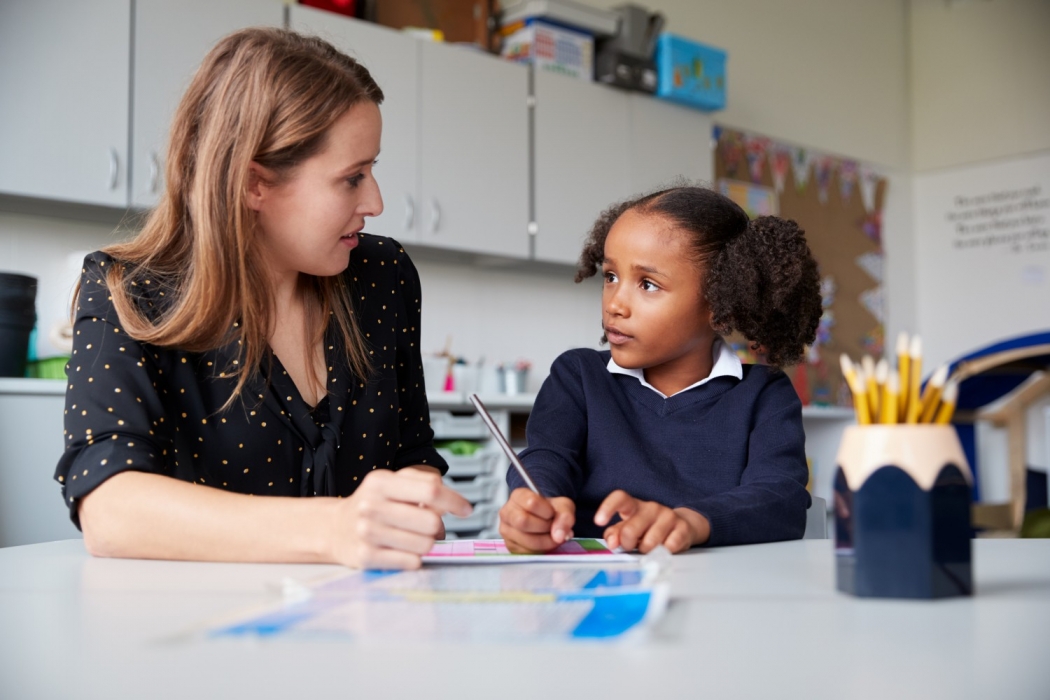After Philando Castile was killed by a police officer in Minnesota in 2016, Tru Pettigrew saw the impact the shooting had in North Carolina schools.
An author and consultant from Cary, Pettigrew travels the state leading discussions on topics that can cause division, dysfunction and separation. On a summer morning after the shooting, he put students on a panel so educators could hear their voices.
One child, a Black student, spoke of how hurt he was. How emotionally devastated and traumatized he felt. How close he was to not even attending school the next day.
He did go to school, and what he remembers was walking into his white teacher’s classroom and seeing that it was business as usual.
“He wondered, ‘I’m hurting so bad, I’m devastated,’” Pettigrew said. “‘How can this teacher not feel the same way?’ And so [he] crafted this narrative in his mind that she just doesn’t care. And to him, that meant she doesn’t care about him.”
Watch full sessions from the conference at The Friday Institute’s YouTube channel here.
The teacher heard her student open up, and she also felt devastated. In reality, she was hurting after the Castile shooting, too. She just didn’t know whether she should say anything. She didn’t know whether it was appropriate.
Her silence spoke for her. Misspoke for her, actually.
During the two-day virtual NC Conference on Educational Equity, hosted last week by The Friday Institute, panelists implored the more than 1,000 attendees across the state to move beyond discomfort and engage in “courageous conversation.”
That’s what panelist Meredith Southworth decided to do. Southworth, a Pitt County Schools teacher, was the lone white voice on a keynote panel of educators. While her Black and brown colleagues expressed eagerness to have a conversation about equity, she opened up about her fears. In a brave moment of vulnerability, she said she felt scared she might say the wrong thing.
“Then I realized that saying the wrong thing is a whole lot better than saying nothing at all,” she said. “So just agreeing to be a part of this panel was a huge learning experience for me.”
That attitude, coupled with an open heart, are necessary ingredients to have these vital and pivotal discussions, several presenters said.
“In our education system, we place a lot of emphasis on academic intelligence,” Pettigrew said. “But we also have to understand the importance of social and emotional intelligence for our students, as well as for our educators. Because we can no longer ignore the social impact of the events and the incidents that are taking place in our society, the impact that it has on our students as well as the teachers. We carry that with us into the classroom. So not having these conversations, not addressing these issues, not having a willingness to talk about it, is hurting us.”

Tru Pettigrew and Tony Godwin kicked off the NC Conference for Educational Equity, organized by moderator Patricia Hilliard. Hilliard introduced the conference asking educators to “transfer power and elevate the talented individuals in your districts that have been overlooked, marginalized or ignored.”
How to have courageous conversations
Pettigrew, who kicked off the conference sharing keynote honors with former Cary Chief of Police Tony Godwin, says the key is coming in with an open heart.
Pettigrew had a judgment about the police. Most officers he’d encountered didn’t look like him, and his experiences with police growing up in West Baltimore were not good. As an adult — a father — living in Cary, he worried that his son might not be safe around the police. So he decided to have a conversation.
“That is how Chief Godwin and I met,” Pettigrew said. “I went down to the Cary PD to have a conversation with law enforcement about their thoughts on what I perceived to be social injustices across our nation, and how their officers treat people that look like me, and if I had to worry about my son. And that opened up a conversation that started a dialogue that has continued for over six years, where we now host courageous conversations to encourage officers in the diverse communities that they serve, to [help them] have these courageous conversations.”
Godwin echoed the importance of conversation, noting how much more he knows because of his relationship with Pettigrew.
“I was a good guy, and I was a good police officer,” he said. “But there were just things I didn’t know. And we all have that. We’re all hamstrung by that, if you will. We don’t know what we don’t know. And it takes having courageous conversations. It takes talking to people who don’t look like us and getting perspective that is different than our perspective for us to really grow and learn the things that we don’t know.”
Here’s how Godwin and Pettigrew suggest having courageous conversations:
“I think the most important thing is coming to the conversation with the right heart,” Godwin said. “… People will see that and they’ll see the sincerity, and they’ll give you grace, because you probably won’t say everything the best way possible.”
Pettigrew echoed that, and talked about a “Heart – Head – Hands” approach. It starts with approaching the conversation with a right heart, to foster a safe space to hear each other and connect with the other’s experiences.
“That allows all parties involved the opportunity to develop levels of empathy, that can now put us in the right headspace and the right frame of mind to say, ‘Well, what can we do together to come up with some solutions to prevent this from happening to any of us?’” Pettigrew said. “So now we’re segueing from the heart to the head.”
When the head comes up with ideas, it’s followed by the hands – which carry out action.
The power of conversation
Six years ago, Pettigrew and Godwin were hesitant around each other. Pettigrew openly says he was distrustful. Today, he calls Godwin his brother. And Godwin says his life is richer because of Pettigrew.
That’s the power of conversation.
“And it’s so encouraging, so exciting, simply by a willingness to get to know others and to educate ourselves — to educate ignorance and not to condemn it,” Pettigrew said. “I think, too often, when we see things or experience things that we don’t understand, and if it offends us, our response is to condemn it when someone is simply operating out of ignorance. But as educators, we all know the solution to ignorance is education, not condemnation. If we condemn someone’s ignorance, then we simply drive them further apart.”
An especially dangerous result now, Pettigrew said — calling this a time when educators need to come together for the sake of students and society’s future.
Black students in North Carolina are suspended at a rate 4.1 times that of white peers. At least three sessions talked about the importance of conversation in engaging students to address racial inequity and disproportionate suspension rates – as well as referrals of Black and brown students to the criminal justice system.
Former State Principal of the Year Tabari Wallace said emphasizing social-emotion connections by the classroom teachers, moving beyond the delivery of curriculum to conversation, could help.
“We sometimes understand their ‘why’ of behaviors; that is our point of privilege as administrators because we get them in the office and we talk to them for 30 or 40 minutes – the teachers have to teach them for 90 minutes,” Wallace said. “ … We get to know them. Sometimes teachers get frustrated: ‘You’re supposed to sit them for 10 days.’ But they don’t understand the child did that because the child was up all night watching his brother.”
Speaking more broadly about equity, including practices to support the LGBTQ and learning differences communities, Shaftina Snipes of the Charlotte-Mecklenburg School System said: “This is a conversation that actually needs to go back into our schools because it’s very important that we look at our students as individuals and that we assess their individual situations. Because what may work for me may not work for another child. And we won’t know that until we have these conversations.”
What makes a conversation effective?
Not all conversations are powerful, though. For example, some conversations around racial equity, said Guilford County Schools Superintendent Sharon Contreras, aren’t really about racial equity.
“Superintendents really have to understand the historical inequities in education and the context, in that it’s rooted in American slavery,” said Contreras, addressing fellow district leaders. “If you don’t understand that, you’re not going to be able to address this well. You have to understand the deliberate efforts in this country to not educate, or undereducate, Black people, people of color, and the root of the shameful disciplinary policies that are grounded in the criminalization of Blackness, which are tied to labor that perpetuates wealth and power. That’s very important to understand. It’s not just as simple as a code of conduct and people are biased.”
After acknowledging and understanding this historical context, Pettigrew says conversations should focus on action. He referred to recruitment practices aimed at attracting diversity. While applauding that, he said diversity is a state of existence and not a goal or action.
“Diversity, by definition, is the state of being different,” he said. “… And the most operative phrase in that definition is, diversity is a state of being.”
That means it doesn’t do anything on its own. Nor is it a goal to achieve. The goal, Pettigrew said, is inclusion – which he defined as the act of making someone feel a part of something.
“Are we making those that look different than us,” he said, “particularly those that are part of historically marginalized communities — are we making them feel included and a part of that institution, that larger organization — are we making them feel as though they are valued, that their voice matters?”
But if diversity is a state of existence and inclusion is the goal, how do you maximize the value of diversity by achieving inclusion? That, he said, is what equity conversations should be about.
“Equity, by definition, is fair and impartial treatment,” he said. “But as we think about equity in education and other institutions, it is essentially giving people what they need to succeed. And in other terms, it’s meeting them where they are because everyone did not start at the same starting point. Everyone is at different places on their journey.”
This means learning, through conversation, where students are in order to understand where and how to meet them. And sometimes it means treating them differently, because the circumstances acting on them necessitate a different approach to develop their talents.
“One of the reasons that we believe we’re experiencing so much racial tension and division across the country, and even in our schools, is because we don’t take the time to be as inclusive as we could be or as we should be,” Pettigrew said.“It begs the question: Are we giving them everything they need to succeed? Are we being equitable?”
Rupen Fofaria is the Equity and Learning Differences Reporter at EdNC.org. This article was reprinted with permission.






